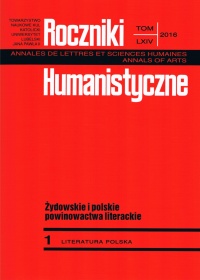A Ball at the Opera: Apocalypse by Jewish Julian Tuwim
Abstract
Julian Tuwim’s Bal w Operze (A Ball at the Opera) is one of the most remarkable of the apocalyptic visions which were produced in the doom-laden years prior to the outbreak of the Second World War. When he began to write it the optimism which had characterized the 1920s had long been dissipated.
The worsening political climate was particularly painfully felt by Tuwim. As someone who considered himself both Polish and Jewish the pervasive climate of antisemitism, stimulated as it was by Hitler’s coming the power in Germany, the persistence of the depression and the willingness of a section of the government camp to adopt an antisemitic platfrom was extremely painful to experience. A Ball at the Opera is a savage description of a corrupt fascist dictatorship written by an individual in despair. Unlike some other Polish ‘catastrophist’ writers of the 1930s, such as Gałczyński and Witkiewicz, Tuwim clearly situates this fascist dystopia in Poland. It is an apocalyptic poem where Tuwim’s horror of a corrupt society’s filthy doings fuses with a foreboding of the destruction of that society.
Copyright (c) 2016 Roczniki Humanistyczne

This work is licensed under a Creative Commons Attribution-NonCommercial-NoDerivatives 4.0 International License.





